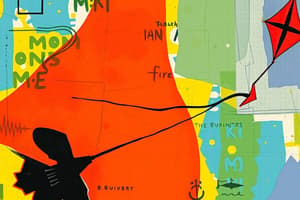Podcast
Questions and Answers
What is the narrative perspective in Chapter 15?
What is the narrative perspective in Chapter 15?
- Hassan's
- Amir's
- Third-person
- Rahim Khan's (correct)
Rahim Khan's narration is considered less biased than Amir's.
Rahim Khan's narration is considered less biased than Amir's.
True (A)
In what context does Rahim Khan express loneliness?
In what context does Rahim Khan express loneliness?
He expresses a sense of loneliness and asks for forgiveness from Allah.
What does Ali's death symbolize?
What does Ali's death symbolize?
What qualities of Hassan are emphasized in Rahim Khan's description?
What qualities of Hassan are emphasized in Rahim Khan's description?
What does Hassan wish for Amir despite being mistreated?
What does Hassan wish for Amir despite being mistreated?
What memories does Hassan value about Amir?
What memories does Hassan value about Amir?
Hassan is portrayed as naïve throughout the narrative.
Hassan is portrayed as naïve throughout the narrative.
What does the description of Sanaubar contrast?
What does the description of Sanaubar contrast?
How does Sanaubar compensate for her past absence?
How does Sanaubar compensate for her past absence?
What skill does Hassan teach Sohrab?
What skill does Hassan teach Sohrab?
What does Hassan fight against by teaching his son?
What does Hassan fight against by teaching his son?
Study Notes
Narrative Perspective
- Rahim Khan utilizes first-person narrative to share thoughts directly with Amir, creating a less biased perspective compared to Amir’s potentially manipulated storytelling for dramatic effect.
Rahim Khan's Humanity
- Despite being idolized by Amir, Rahim Khan reveals his human side, acknowledging feelings of loneliness and selfish motives, emphasizing the complexity of his character.
Ali’s Death
- The tragic and unjust death of Ali highlights the mistreatment endured by Hazaras and reflects the broader impact of warfare in Afghanistan on marginalized groups.
Significance of Physical Traits
- The description of Hassan’s physical features by Rahim Khan underscores the individuality of Hassan and serves as a reminder that he is more than just a member of his ethnic group, reinforcing his unique identity.
Hassan's Loyalty Toward Amir
- Despite Amir's previous mistreatment, Hassan expresses genuine concern for Amir's happiness, showcasing the depth of their bond and Hassan's enduring loyalty.
Shared Childhood Memories
- Hassan's questions about kites and cinema illustrate the mutual value placed on their childhood memories, contrasting their lives and highlighting Hassan's innocence and lack of adult burdens compared to Amir.
Awareness of Social Change
- Hassan’s sober recognition of the Taliban's threat to Hazaras indicates a greater awareness of social changes and the impending risks faced by minorities, reflecting his understanding of the socio-political landscape.
Sanaubar's Transformation
- The stark contrast between Sanaubar's disfigured state and her former beauty symbolizes the loss of youth and represents a humbler aspect of life, illustrating change and sacrifice.
Maternal Redemption
- Sanaubar’s caring relationship with Sohrab serves as a means of redemption for her past actions, challenging perceptions of her character and prompting questions about Amir's own potential for redemption.
Parental Influence
- Hassan’s nurturing role in teaching Sohrab, contrasted with Amir’s cold upbringing, highlights the positive impact a father can have and critiques Amir’s own lack of paternal connection.
Resistance Against Oppression
- Hassan’s determination to educate Sohrab counters traditional norms and seeks to break the cycle of illiteracy and discrimination faced by the Hazara community, representing a fight for empowerment and equality.
Studying That Suits You
Use AI to generate personalized quizzes and flashcards to suit your learning preferences.
Description
Explore key concepts from Chapter 16 of 'The Kite Runner' with these flashcards. Delve into narrative perspective and essential quotes that shape the themes and character development in the story. Ideal for reinforcing your understanding of this powerful chapter.




